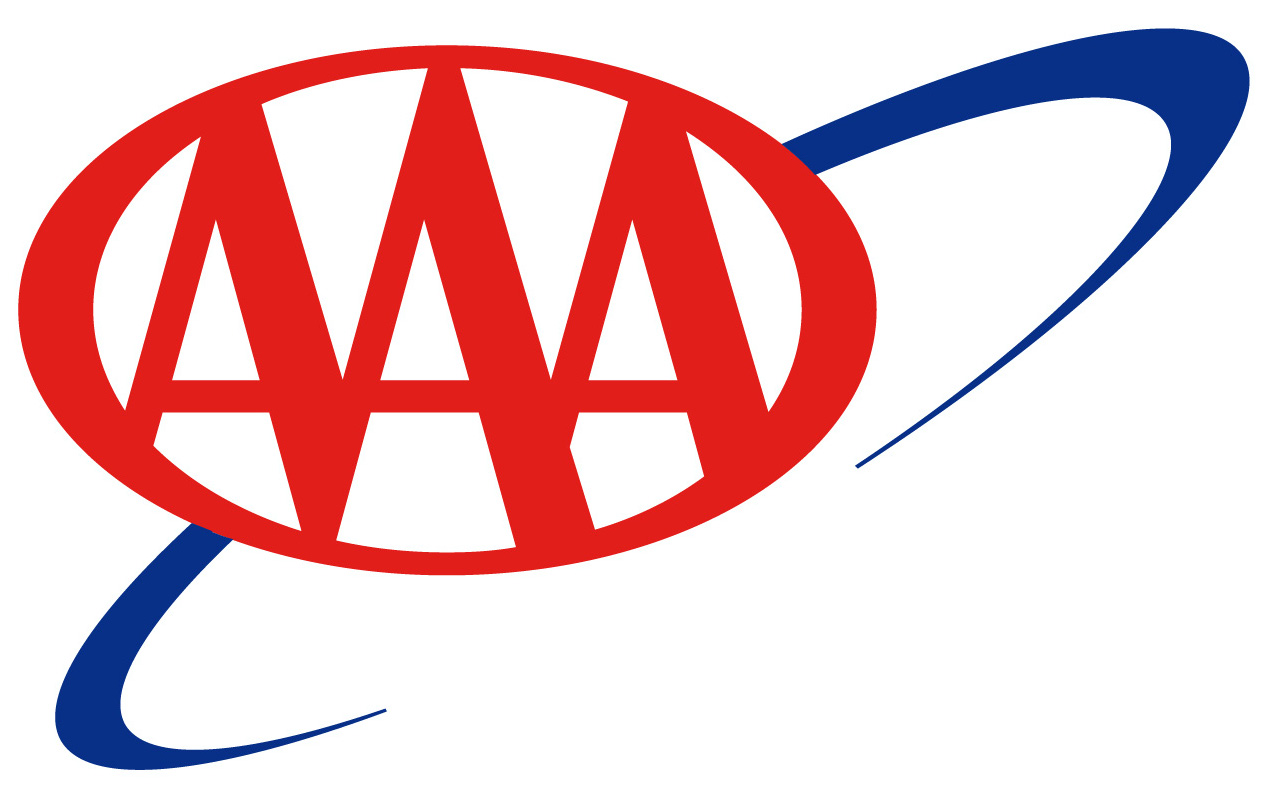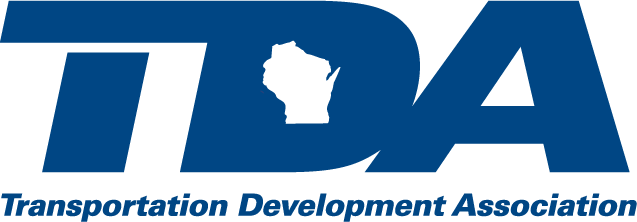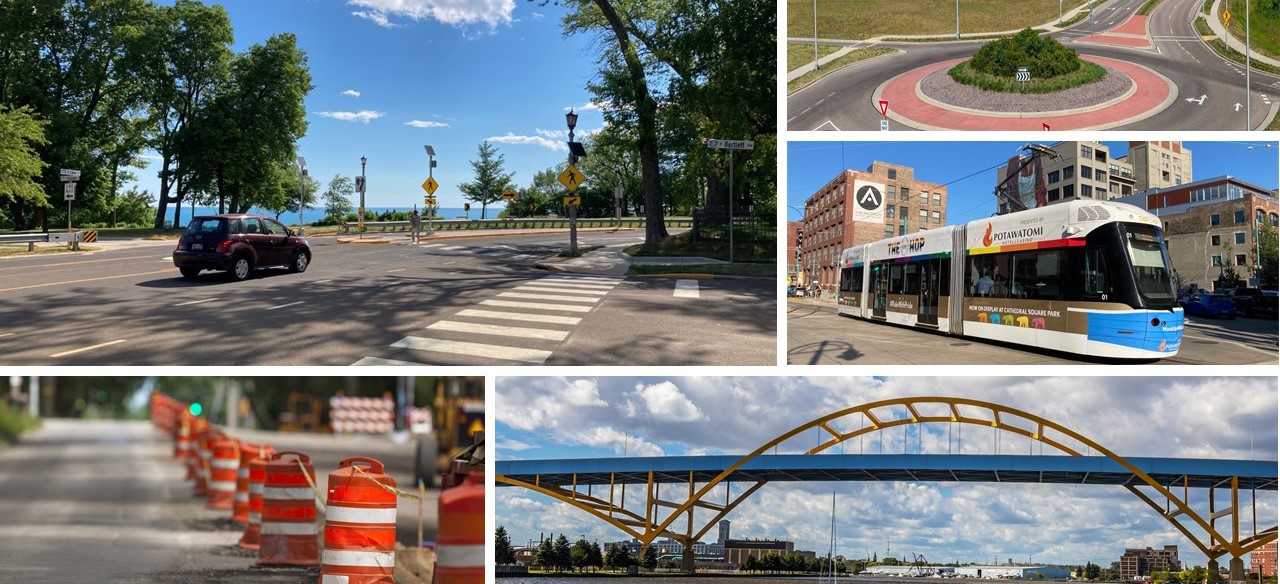Co-hosts:
Institute for Physical Infrastructure and Transportation
Wisconsin Department of Transportation
Friday, October 14, 2022 – 8:00 am to 3:00 pm
UWM Student Union – Ballroom
2200 E. Kenwood Ave.
- Bringing academics, students and practitioners together to network and share information on topics of interest to transportation professionals in southeastern Wisconsin and beyond.
- Showcasing practical applications of transportation related academic research.
- Providing an opportunity for Wisconsin DOT and other presenters to share their innovative practices with the broader transportation community.
- PDHs ($30) available at the event.
- Register early for this event. $25 registration fee includes lunch, parking and the Design Thinking Workshop.
- STUDENTS, FACULTY AND STAFF: enjoy complimentary admission and parking.
Registration is closed; please contact Mark Gottlieb at markgott@uwm.edu with questions.
Schedule
| 8:00 – 8:30 | Registration and Continental Breakfast |
| 8:30 – 8:45 | Welcoming Remarks Paul Hammer, Deputy Secretary, Wisconsin Department of Transportation Xiao Qin, Director, UWM Institute for Physical Infrastructure and Transportation |
| 8:45 – 9:15 | Keynote Speaker – Milwaukee Mayor Cavalier Johnson |
| 9:15 – 9:30 | Break and Networking |
| 9:30 – 10:45 | Breakout Sessions 1-2 |
| 10:45 – 11 | Break and Networking |
| 11:00 -12:15 | Breakout Sessions 3-4 |
| 12:15 – 1 | Box Lunch with Speaker (Wisconsin Department of Transportation Secretary Craig Thompson) |
| 1:15 – 3:15 | Design Thinking Workshop |
markgott@uwm.edu
414-828-9846
Thanks to our Sponsors






Speaker Biographies
Breakout Sessions
Innovative practices in infrastructure development
| Topic | Presenter |
|---|---|
| I-94 East-West project update: Innovation, partnerships and design Learn more about the I-94 East-West mega project in Milwaukee. Located between 70th and 16th streets, the corridor serves an ethnically and financially diverse community. Traffic from around the region, state and nation passes through this corridor, with major institutions and tourist attractions that are in close proximity, including: Veterans Administration complex, American Family Field, Molson Coors Brewery, Menomonee Valley businesses, including Potawatomi Casino. Hear about the Stadium Interchange design and the public involvement effort leading to a public hearing this fall. | Joshua LeVeque (WisDOT) and Joe Ulatowski (HNTB) |
| Transportation Design Collaboration: Moving beyond buzzwords The current design of the I-41 corridor from Appleton to DePere involves hundreds of staff from many organizations working on thousands of engineering files. The corridor team is piloting new technologies focused on design collaboration, technical review, and sharing engineering data with non-technical staff. This presentation showcases these technologies and the benefits gained | Eric Arneson (WisDOT) |
| Innovative public-private stormwater management practices Through an agreement with Kenosha County and Racine County, the Wisconsin Department of Transportation (WisDOT)/Kapur Team prepared engineering plans for County KR improvements between County H and Old Green Bay Road in Racine and Kenosha counties. The conversion of a two-lane rural roadway to a four-lane urban divided roadway enlarged the impervious area by about 100%, requiring stormwater runoff management to address water quantity and quality. The project included the best traditional stormwater management practices, such as a vegetation-lined ditch, stormwater wet detention ponds, and a Regenerative Stormwater Conveyance (RSC). RSC (Regenerative Stormwater Conveyance) is an innovative solution that reduces suspended solids, nitrogen, and phosphorus by 50% more than a standard stormwater pond at a similar cost. The RSC also meets or exceeds stormwater conveyance volume and velocity requirements. WisDOT was glad to partner with Root Pike WIN on implementing this innovative solution. | Carrie Bristoll-Groll (Stormwater Solutions Engineering, LLC) and Dave Giordano (Root-Pike Watershed Initiatives Network) |
Research, planning and implementation of transportation safety.
| Topic | Presenter |
|---|---|
| The Promise and Pitfalls of Driver Assistance Technology on the Road to Zero This presentation will review the latest research from AAA and the AAA Foundation for Traffic Safety on the effectiveness – as well as limitations – of advanced driver assistance systems currently available to consumers, such as the effectiveness of Driver Monitoring (intended to keep track of driver engagement behind the wheel) and the impact of precipitation of vehicle sensors. Will also look at the expectations and understandings of ADAS system among various road users (drivers, pedestrians, cyclists and transit riders) and how these systems change driver behavior over the course of time. | Nick Jarmusz (AAA-Wisconsin) |
| City of Milwaukee Comprehensive Crash Analysis: Establishing a Baseline for Vision Zero This presentation will describe results from a comprehensive crash study conducted for the City of Milwaukee Department of Public Works by Toole Design Group and UW-Milwaukee. It will cover long-term trends in pedestrian, bicyclist, and motor vehicle crashes, injuries, and fatalities from 1994 to 2020 and describe street design, behavior, and demographic factors associated with higher injury severity. This research complements the City of Milwaukee’s June 2022 resolution to become a Vision Zero city and eliminate traffic fatalities and serious injuries within 15 years. | Robert Schneider (UW-Milwaukee) |
| Trade-off between safety, mobility and stability in automated vehicle following control: Theories and field experiments Automated vehicle (AV) following control impacts traffic safety, mobility and stability. Our empirical study showed that commercial AV following control became more unstable as the headway was set to a smaller value, implying a possible intrinsic trade-off between safety, mobility and stability aspects in AV following control design. We further analytically explained the underlying vehicle control mechanism that dictates this trade-off. We investigated a parsimonious linear AV following model that captures the first-order parameters on the safety, mobility and stability aspects. The string stability results indicate that the minimum headway considering safety buffer alone may be hardly achieved due to stability concerns, and practical AV control needs to either allow a longer headway to trade for string-stable traffic or conversely accommodate moderate string-instability to trade for a smaller AV following headway. This finding also provides a possible explanation on observed string instability of commercial AV following control (e.g., adaptive cruise control) as a trade-off for a smaller headway and how to improve AV control to balance safety, mobility, and energy efficiency. | Xiaobing Li (UW-Madison) |
Connected and autonomous vehicles, electrification and other emerging technologies in transportation
| Topic | Presenter |
|---|---|
| Wisconsin Electric Vehicle Infrastructure Plan Kaleb’s presentation will focus on WisDOT’s initial efforts in preparing to support the conversion to electric vehicles. The presentation will detail the department’s ongoing collaborative efforts and partnerships. The presentation will also highlight WisDOT’s Wisconsin Electric Vehicle Infrastructure Plan which will guide the department in administering $78.65 million in federal funds to support the construction of electric vehicle charging stations. | Kaleb Vander Wiele (WisDOT) and Andrew Conley (HNTB) |
| WisDOT Connected and Autonomous Vehicle Strategic Work Plan This session will cover the basics of connected and automated vehicle technologies and their impact on transportation. We will talk about how the WisDOT CAV Strategic Plan is guiding the projects that are planned to help prepare the state for using CAVs, through coordinating local communities and external stakeholder groups, testing infrastructure technologies, participating in CAV research initiatives, and working with other states to harmonize policies to make interstate CAV travel seamless. | Brad Basten (WisDOT) |
| The Bipartisan Infrastructure Law and Federal Support for Emerging Technologies The Bipartisan Infrastructure Law contains several provisions to accelerate innovation, emerging technologies and transportation equity. This presentation will focus on the BIL and its impact on the federal role in transportation. | Glenn Fulkerson (FHWA) |
Transit, mobility options and access to jobs
| Topics | Presenter |
|---|---|
| The Milwaukee Flex-Ride Pilot Program Flex Ride Milwaukee is a new on-demand transportation service that connects Milwaukee neighborhoods with jobs in the Menomonee Falls/Butler area, funded by a pilot grant from the National Science Foundation. The state of Wisconsin recently awarded a $4.2 million grant to extend the service through 2024, and expand it to serve other communities in the region. This presentation will focus on how Flex Ride, and similar microtransit services, can solve the dual problems of worker shortages and lack of affordable access to suburban job centers that are not served by traditional fixed-route transit. | Kevin Muhs (SEWRPC) |
| WisDOT Non-Drivers Advisory Committee The Wisconsin Department of Transportation (WisDOT) formed the Wisconsin Non-Driver Advisory Committee (WiNDAC) in 2020 as an advisory forum to discuss transportation mobility, safety and access for Wisconsin’s non-driving populations. This presentation will discuss the history of the committee, its structure, accomplishments, and its potential to serve as a model for other states. | Denise Jess, Tami Jackson and Ryan Spaight (WisDOT) |
| I-794 Green Infrastructure This project started with an opportunity to enhance pedestrian access and user experience while also reducing pollution through thousands of gallons of storm runoff from an I-794 overpass in Milwaukee. The overriding challenge for this project was to design and construct features that would allow the needed bridge inspections and maintenance to take place while assisting in the capture of stormwater runoff and addressing the needs of the persons living at this location. The project incorporated bike and pedestrian facilities. The new pathway also helps to connect to bus and rail services at the Intermodal Station. The project is also helping improve the nearby waterways further, opening up use of the connected rivers and Lake Michigan. The local BID (Business Improvement District) was involved in the planning of the project and has been supportive due to the integration of this project with others in the area to improve the livability and usefulness of the local area while encouraging economic activity. The implementation of the project and the effort to help the homeless in this location get into housing has transformed the area from a location suffering from social issues (drug use and other criminal activity) to a welcoming space for all to use and enjoy. The support for this project was a direct result of multiple units government partnering with social services, law enforcement, business groups and local stakeholders. By leveraging the collective efforts of all the groups involved in this project, we were able to connect with the stakeholders and impacted persons from the very start of the project. The City of Milwaukee and MMSD were the leads for the initial outreach concerning the design of the project while WisDOT and the county spearheaded the efforts to contact and assist the homeless persons located in the footprint of the project in finding housing. The completion of construction was marked by a community event to celebrate the new space and recognize the efforts of all involved. This project has served as a shining example of coordination and communication among a wide range of government and public entities. The project itself has opened up further discussions on how to activate underutilized space in a socially responsible manner. The partnership which was developed to deliver this project has lived on beyond the completion of this project and continues to work to address homelessness and help to further improve the infrastructure within the area. The same group has been meeting and working together since the summer of 2019. The project was recognized with an award for Intergovernmental Cooperation. | Bao Tran (WisDOT) and Kevin Shafer (MMSD) |
Understanding the needs of different system users is key to finding new and innovative solutions to society’s transportation challenges.
Join us at the UWM Lubar Entrepreneurship Center for this hands-on group exercise, where you will be introduced to a new approach to creative problem solving – “Design Thinking.” The approach has been used to innovate products, services and solutions by understanding the needs of the customers and stakeholders. Design Thinking provides a structure to frame the problem space, ideate and test solutions. The approach can help move from a large and ambiguous problems space to more tactical problems where we can prototype and test solutions.
In this workshop, you will experience the design thinking process first-hand, learn techniques to identify and frame problems, practice and refine tools for ideation, and learn ways to test solutions early in the process. Participants will also develop and understanding of the language and process of design thinking that will help them as they lead their own innovation teams.
The Workshop will be facilitated by Dr. Ilya Avdeev and Brian Thompson.
